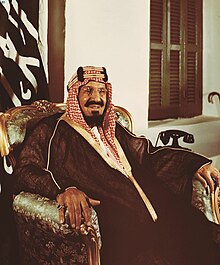
Back Abdoel Aziz al-Saoed Afrikaans عبد العزيز آل سعود Arabic عبد العزيز بن عبد الرحمن ال سعود ARZ ГӀабдулгӀазиз ибну ГӀабдурахӀман СагӀуд AV Əbdüləziz bin Əbdürrəhman əs-Səud Azerbaijani ملک عبدالعزیز AZB Hadeng Abdul-Aziz BCL Абдэль Азіз ібн Сауд Byelorussian Абдул Азиз бин Сауд Bulgarian আবদুল আজিজ ইবনে সৌদ Bengali/Bangla
Abdulaziz bin Abdul Rahman bin Faisal bin Turki bin Abdullah bin Mohammed bin Saud (Arabic: عبد العزيز بن عبد الرحمن بن فيصل بن ترکي بن عبدالله بن محمد بن سعود; 15 January 1875[note 3] – 9 November 1953), known in the Western world mononymously as Ibn Saud (Arabic: ابن سعود; Ibn Suʿūd),[note 4] was an Arab political and religious leader who founded Saudi Arabia – the third Saudi state – and reigned as its first king from 23 September 1932 until his death in 1953. He had ruled parts of the kingdom since 1902, having previously been Emir, Sultan, and King of Nejd, and King of Hejaz.[1]
Ibn Saud was the son of Abdul Rahman bin Faisal, Emir of Nejd, and Sara bint Ahmed Al Sudairi. The family were exiled from their residence in the city of Riyadh in 1890. Ibn Saud reconquered Riyadh in 1902, starting three decades of conquests that made him the ruler of nearly all of central and north Arabia. He consolidated his control over the Nejd in 1922, then conquered the Hejaz in 1925. He extended his dominions into what later became the Kingdom of Saudi Arabia in 1932. Ibn Saud's victory and his support for Islamic revivalists would greatly bolster pan-Islamism across the Islamic world.[2] Concording with Wahhabi beliefs, he ordered the demolition of several shrines, the Al-Baqi Cemetery and the Jannat al-Mu'alla.[3] As King, he presided over the discovery of petroleum in Saudi Arabia in 1938 and the beginning of large-scale oil production after World War II. He fathered many children, including 45 sons, and all of the subsequent kings of Saudi Arabia as of 2024.
Cite error: There are <ref group=note> tags on this page, but the references will not show without a {{reflist|group=note}} template (see the help page).
- ^ John B. Glubb (5 November 2021). "Ibn Saud". Encyclopædia Britannica.
- ^ Muhamad Ali (2016). "Controlling Politics and Bureaucratising Religion". Islam and Colonialism: Becoming Modern in Indonesia and Malaya. Tun: Edinburgh University Press. p. 150. ISBN 978-1-4744-0920-9.
- ^ Shahi 2013, p. 51.
